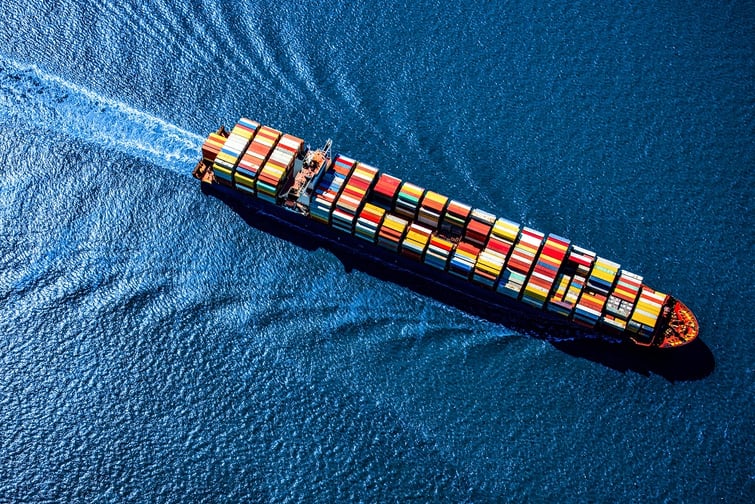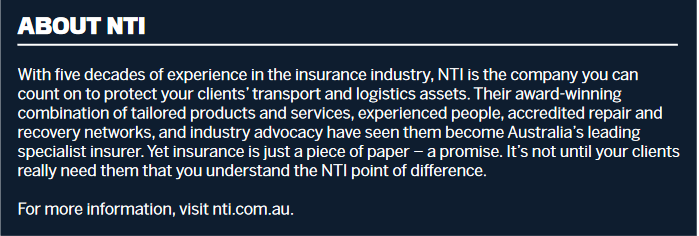

After more than 20 years in the industry, Daniel Morrison has been privy to some large-scale changes in the marine insurance space. But right now, he says he’s witnessing the biggest state of change he’s ever seen in his career. As national cargo product manager at NTI, Morrison is keenly aware of the shifts in the industry that have occurred during 2020 as a result of the COVID-19 pandemic.
“I don’t think we really know the full effects just yet,” he says. “Obviously there have been major delays and backlogs, which causes further supply chain issues and impacts the ability of businesses to service their own clients. It’s complex.”
Businesses dealing in perishables have been the most heavily affected, Morrison says, but he also believes that the situation has highlighted numerous other issues within the industry that were already bubbling beneath the surface.
“Globally, the industry has to look at some significant changes in the ways it does business,” he says. “The commoditisation around cargo insurance in particular has meant the competitiveness has been geared solely around pricing for years, and that’s rendered it unprofitable.”
Nonetheless, Morrison says it’s an exciting time to be in the field. A shift away from purely price-based competition also means more opportunities for businesses to shine on other fronts. “Once the wheels start squeaking, new solutions start getting innovated,” he says.
“The commoditisation around cargo insurance has meant the competitiveness has been geared solely around pricing for years, and that’s rendered it unprofi table” Daniel Morrison, NTI
Mike Sullivan, national manager of marine claims at NTI, agrees. “Marine is a pretty tradition-heavy environment,” he says. “That offers certain benefits because it means that there’s been a lot of precedents set by previous claims and legal cases. You’ve got experience to draw on.”
The downside, Sullivan explains, is that insurers and brokers can spend too much time leaning on that tradition, rather than proactively looking for ways to push the business forward.
“There’s no question COVID-19 has been inconvenient for everyone, to say the least,” Sullivan says. “But we have seen that it’s really sped up investment and embrace of digital processes. Things are getting streamlined, even in complex areas like marine, and we’re starting to see it spur a wider movement towards better service standards as the conversation shifts away from being solely price-based.”
So how can brokers best leverage the current uncertainty to their advantage? And what sorts of conversations do they need to be having with existing customers to ensure that their needs are being met during these times of upheaval?
First and foremost, Sullivan sees it as a conversation about the future of the client’s business, rather than insurance. What sorts of changes are they making to adapt to the new environment? How are they being affected by wider supply chain issues? Have they shifted to an e-commerce model or enhanced their current offering? These are complex questions to wrestle with, but they’re conversations that need to be had prior to making insurance decisions, Sullivan says. The ease of doing business under new circumstances is a prime consideration.
“At the moment we’re seeing tensions in trade between China and a good chunk of the rest of the world,” he says. “There’s no question that will present an issue for people trading in that area, and of course, cargo insurance follows the trade. We’re going to see businesses reducing their current exposures by investing in new supply chains. Couple that with the increased push for initiatives like click and collect, and there’s clearly going to be new considerations in play moving forward.”
Morrison stresses the importance of communication between all of the parties involved in the insurance process.
“Brokers perform a critical service in terms of translating policies to customers and then making sure they understand the nature of their coverage,” he says. “Additionally, they liaise with insurers to ensure that we understand the needs of the customer and the products we offer are actually keeping pace with the requirements in the field.”
“[COVID-19 has] really sped up investment and embrace of digital processes. Things are getting streamlined, even in complex areas like marine” Mike Sullivan, NTI
To this end, NTI works to communicate with brokers as extensively as possible, aiming to provide easier and faster access to current updates about the industry.
“We use a variety of means, like webinars, LinkedIn updates and articles,” Morrison says. “We also run training sessions and participate in conferences. It’s not just about making people aware of who NTI are – it’s about fostering wider connections within the broking industry and helping them offer the best possible service.”
Looking ahead to the next 12 to 18 months, Morrison believes that there will likely be a hardening in marine pricing and likely some reduced capacity.
“There’s a pricing war at the moment,” he says. “I don’t think it’s going to last that long, though. Insurers losing money isn’t a viable long-term solution, and it only reduces competition within the field.”
The recovery of the Australian economy will also play a critical role. At the time of writing, numerous government protections are in place for businesses, but as these wind down, there will be greater clarity into which companies are effectively equipped to survive.
“Everything’s in a state of flux at the moment,” Morrison says. “It’s going to be difficult to see significant change in such a short timeframe, but I think new opportunities will emerge out of it.”
Sullivan believes there won’t be a full return to normal until around mid-2021. “It’s certainly going to be a different environment,” he says. “Couple that with the wider concerns about a recession, and I think we’ll probably see the landscape looking very different by this time next year.”
Future waves of COVID-19 also remain a concern, but Sullivan doesn’t believe disruptions will be as significant moving forward. China was the first country aff ected, and it also controls five of the largest ports in the world, he notes.
“It was akin to the effect of a car crash on a freeway,” Sullivan says. “Even though the mess is cleared up relatively quickly, there’s still a big flow-on impact. Given that they seem to have moved well past the effects of the disease now, I don’t think we’ll have the same problem again.”
Despite all the change, both men remain certain of one thing: marine insurance will have an important role to play in Australia’s economic recovery. The country’s heavy reliance on exports means that insurance is essential – exports rely on credit, and banks won’t provide loans to companies that aren’t able to secure insurance.
“Insurance is critical,” Morrison says. “It’s essential that we have a viable and competitive insurance industry in place to guarantee that businesses can get the coverage they need. We’re very much looking forward to helping be part of that process.”

